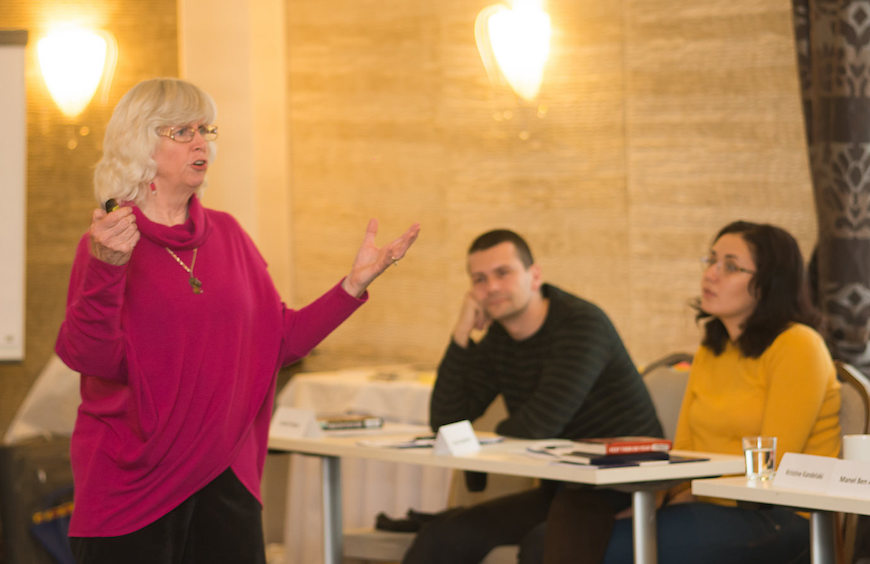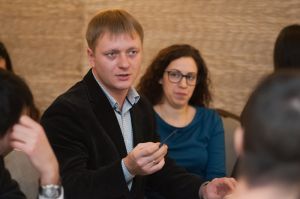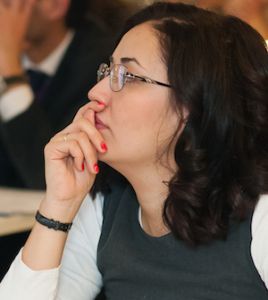NGOs in Emerging Democracies Learn Skills To Advance Mission
Thursday, December 15, 2016

Professor Linda Gasser, WDI faculty affiliate and a founder of the Central Europe Human Resource Education Initiative, who led the NGO management session.
Non-governmental organizations (NGOs) around the world are facing increased scrutiny and even intimidation by government ministries and regulators in several emerging democracies. Equipping them with the managerial skills and tools they need to advance positive social and political change is critical to their missions, and was the focus of a four-day workshop in Bratislava, Slovakia earlier this month.
WDI, along with the Weiser Center for Europe and Eurasia at the University of Michigan and the Slovakia-based Pontis Foundation, organized the NGO Leadership Workshop. Twenty-five NGO leaders from 14 countries, including Uzbekistan, Kazakhstan, Ukraine, Moldova, and Georgia, participated in several highly interactive sessions during the workshop.
This was the second year WDI partnered with the Weiser Center, which sponsored the event, and the Pontis Foundation to coordinate the NGO Leadership Workshop. It comes at an especially challenging time for many NGOs. As communist regimes fell in Central and Eastern Europe, South Eastern Europe, and the former Soviet Union, civil society organizations emerged to help support the fledgling democracies in these regions. However, distrust in NGOs has generated new problems for their managers.
“NGOs from across this region are in a particularly difficult position these days,” said Amy Gillett, vice president of WDI’s Education Initiative. “Some of the countries stigmatize them as ‘foreign agents’ — meaning they are an enemy of the state and, therefore, under surveillance. This creates an atmosphere where people in the society do not want to associate with them.”
The NGO Leadership Workshop, held Dec. 6-9, attempted to maximize the effectiveness of the organizations by giving their leaders the necessary skills to properly interact with international partners, government stakeholders and the public. The daily workshop topics were: planning and sustainability of NGOs; essentials of NGO management; marketing strategy for the NGO; and, advocacy and public policy building.
 “The changes in the government of these countries cause tremendous stress,” said Professor Linda Gasser, WDI faculty affiliate and a founder of the Central Europe Human Resource Education Initiative, who led the NGO management session. “People need to find ways to mitigate this. The great value in this program is that participants are networking and understanding that there are others experiencing similar things.”
“The changes in the government of these countries cause tremendous stress,” said Professor Linda Gasser, WDI faculty affiliate and a founder of the Central Europe Human Resource Education Initiative, who led the NGO management session. “People need to find ways to mitigate this. The great value in this program is that participants are networking and understanding that there are others experiencing similar things.”
Many workshop participants cited the interaction with faculty members, guest speakers and each other as a key benefit of the program. They plan to remain in contact in the months to come and also will receive additional training through WDI’s interactive ExtendEd portal. This portal, designed and implemented by WDI, guides participants’ learning before, during and after a program, and encourages them to apply this knowledge back at their job.
Another workshop highlight was a presentation on the development of civil society in Slovakia by Martin Butora, who served as that country’s ambassador to the U.S. from 1999-2003. He also was one of the founders of the political movement Public Against Violence, which opposed communist rule in Slovakia.
 The presentation was followed by an engaging question-and-answer session with Ron Weiser, former U.S. ambassador to the Slovakia. In 2004, Weiser received the White Double Cross —the highest award given to non-Slovaks — from Slovak President Rudolph Schuster for his work as ambassador.
The presentation was followed by an engaging question-and-answer session with Ron Weiser, former U.S. ambassador to the Slovakia. In 2004, Weiser received the White Double Cross —the highest award given to non-Slovaks — from Slovak President Rudolph Schuster for his work as ambassador.
“Regardless of the countries we come from, we are all experiencing the same problems,” said Nadiia Bureiko, vice head of the Ukraine NGO, Quadrivium. “This program has created a valuable network for future cooperation.”
Stefan Veljkovic, program director of the Kosovo NGO, YEC Synergy, praised the workshop faculty and speakers. He said he learned how to build organizational capacity, recruit people to join a cause and that there are “many ways to get across a message.”
Lenka Surotchak, executive director of the Pontis Foundation, said it might be difficult for someone living in an established democracy to understand the day-to-day fear, struggles and sacrifices of “people fighting for rule of law and attempting to undertake democracy.”
“They do it because they believe in freedom and a better future in their country,” she said. “Interaction with the faculty from one of the renowned U.S. universities, the University of Michigan, the knowledge and belief in their skills, mission and work give them the power and optimism to continue their important job.”
